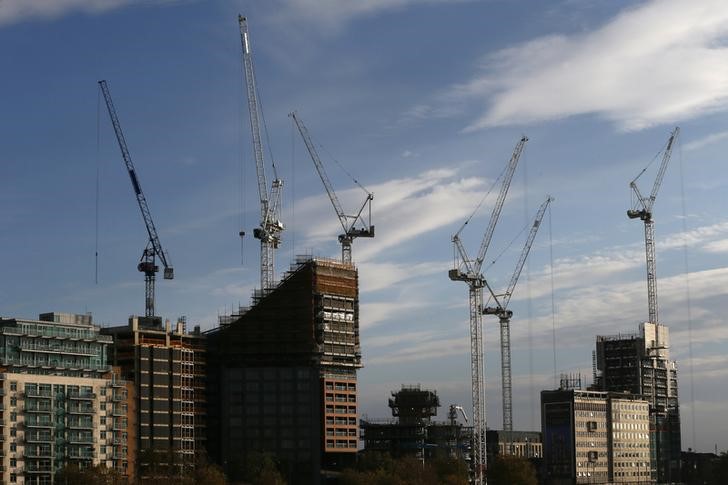By David Milliken and Ana Nicolaci da Costa
LONDON (Reuters) - Britain's economic recovery slowed more than expected in the three months to September after a slump in construction, raising the prospect that more than two years of relatively rapid economic growth is coming to an end.
The economy grew 0.5 percent in the third quarter, official figures showed on Tuesday - a respectable rate by historic standards but below the 0.7 percent seen in the second quarter and economists' expectations for the third.
Year-on-year growth fell to a two-year low of 2.3 percent, after recording its fastest growth since 2005 last year at 2.9 percent, outstripping all other major advanced economies.
Earlier this month the International Monetary Fund forecast growth for 2015 overall would slow to 2.5 percent. That would still be faster than most developed nations and around Britain's historic average.
Many economists viewed Tuesday's figures as consistent with this type of modest slowdown - rather than heralding a sharper contraction linked to China's stock market turmoil - and financial markets' reaction to the data was muted.
"The UK economy's momentum has begun to ease in light of increasing uncertainty and a weaker global environment, as we expected, but remains decent," Barclays (L:BARC) economists said in a note to clients.
Growth was almost entirely driven by Britain's dominant services sector, which picked up pace from the second quarter, while manufacturing shrank for a third quarter in a row and construction suffered its biggest contraction in three years.
Britain's economy as a whole is now more than 6 percent larger than before the financial crisis, but neither the manufacturing nor the construction sectors have returned to pre-crisis levels of activity.
Moreover, some private-sector data have suggested the economy is facing stronger headwinds in the final three months of the year, particularly export-focused sectors vulnerable to sterling's strength and a slowdown in emerging markets.
REVISIONS
The Confederation of British Industry reported the biggest quarterly fall in factory orders for three years on Monday in the three months to October. Surveys of purchasing managers pointed to fourth-quarter GDP growth of just 0.3 percent if they do not improve.
That said, the outsize fall in construction output this quarter, which statisticians partly blamed on a wet August, left some economists hopeful GDP could be revised up, as construction data are revised more than other sectors.
The Bank of England has forecast that after revisions third-quarter GDP growth will creep up to 0.6 percent. It will publish new economic forecasts next week.
BoE policymakers are unlikely to rush into raising interest rates from their record-low 0.5 percent.
Governor Mark Carney has said a decision will come into sharper focus at the turn of the year, and a Reuters poll on Monday showed economists had pushed back their forecasts for a hike to the second quarter of next year from the first.

"The slowdown in UK growth is by no means a disaster, but it will put pressure on the Bank of England to delay the first rate hike, especially as inflation remains in negative territory," Schroders (L:SDR) economist Azad Zangana said, predicting a May 2016 move.